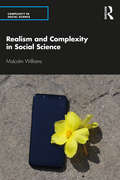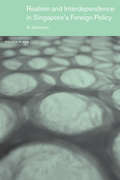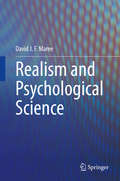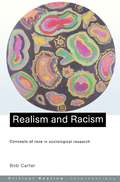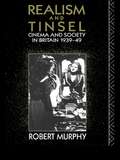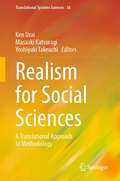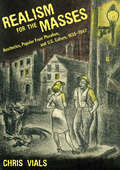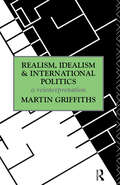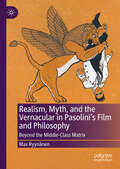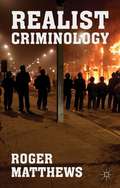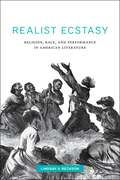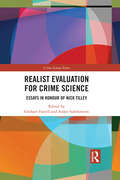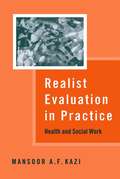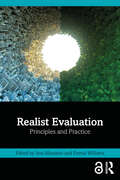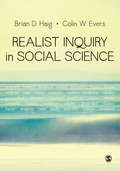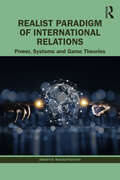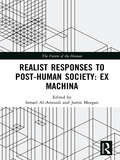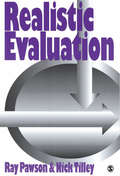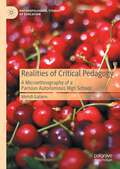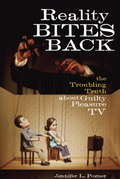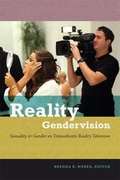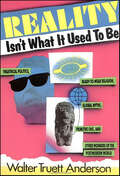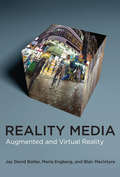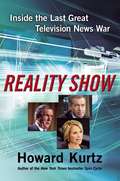- Table View
- List View
Realism and Complexity in Social Science (Complexity in Social Science)
by Malcolm WilliamsRealism and Complexity in Social Science is an argument for a new approach to investigating the social world, that of complex realism. Complex realism brings together a number of strands of thought, in scientific realism, complexity science, probability theory and social research methodology. It proposes that the reality of the social world is that it is probabilistic, yet there exists enough invariance to make the discovery and explanation of social objects and causal mechanisms possible. This forms the basis for the development of a complex realist foundation for social research, that utilises a number of new and novel approaches to investigation, alongside the more traditional corpus of quantitative and qualitative methods. Research examples are drawn from research in sociology, epidemiology, criminology, social policy and human geography. The book assumes no prior knowledge of realism, probability or complexity and in the early chapters, the reader is introduced to these concepts and the arguments against them. Although the book is grounded in philosophical reasoning, this is in a direct and accessible style that will appeal both to social researchers with a methodological interest and philosophers with an interest in social investigation.
Realism and Interdependence in Singapore's Foreign Policy (Politics in Asia)
by Narayanan GanesanSingapore’s existence and success derive in part from its achievements in the domestic political arena and in part from the skilful management of a well-defined foreign policy with clearly identifiable goals and issues. A visible core of realist self-reliance is layered with the demands of a competitive trading state that requires a liberal international trading regime. Hence, both competitive and cooperative philosophies support Singapore’s foreign policy. This text charts the philosophical underpinning of Singapore’s foreign policy output and the institutions responsible for it and examines the importance of economic and defence diplomacy that are central to Singapore’s foreign policy output. It gives particular attention to the two most important regional bilateral relationships -- with Indonesia and Malaysia -- and how relations with its adjacent neighbours have influenced Singapore’s foreign policy. Combining first-hand research with excellent analysis, this volume provides a much-needed report on the survival of a small state in the globalizing world.
Realism and Psychological Science
by David J. MareeThe book provides an argument why realism is a viable metatheoretical framework for psychological science. By looking at some variations of realism such as scientific realism, critical realism, situational realism and Ferraris’ new realism, a realist view of science is outlined that can feature as a metatheory for psychological science. Realism is a necessary correction for the mythical image of science responsible for and maintained by a number of dichotomies and polarities in psychology. Thus, the quantitative-qualitative dichotomy, scientist-practitioner polarity and positivist-constructionist opposition feed off and maintains a mythic image of science on levels of practice, methods and metatheory. Realism makes a clear distinction between ontology and epistemic access to reality, the latter which easily fits with softer versions of constructionism, and the former which grounds science in resistance and possibility, loosely translated as criticism. By taking science as a critical activity an issue such as the quantitative imperative looses its defining force as a hallmark of science - it provides epistemic access to certain parts of reality. In addition, essentially critical activities characteristic of various qualitative approaches may be welcomed as proper science. Academics, professionals and researchers in psychology would find value in situating their scholarly work in a realist metatheory avoiding the pitfalls of traditional methodologies and theories.
Realism and Racism: Concepts of Race in Sociological Research (Critical Realism Ser.)
by Bob CarterThere are continuing difficulties within social science surrounding concepts of race. This book suggests that these difficulties stem from the uncertain ontological and epistemological status of ideas about race, itself a consequence of the recognition that concepts of race have all but lost their relevance as sociologically significant descriptions. This book surveys ways in which social scientists have attempted to come to terms with this situation, before developing an alternative approach based on recent work by realist authors. This approach offers a radical revision of orthodox debates about race concepts, about the possibility of a social science and about the nature of empirical research. This illustrated through two policy examples: an account of post war migration to the UK, and debates about trans-racial adoption in the UK and the USA.
Realism and Tinsel: Cinema and Society in Britain 1939-48 (Cinema and Society)
by Robert MurphyFirst published in 1992. Routledge is an imprint of Taylor & Francis, an informa company.
Realism for Social Sciences: A Translational Approach to Methodology (Translational Systems Sciences #36)
by Yoshiyuki Takeuchi Ken Urai Masaaki KatsuragiThis book discusses the growing interest in realism in social sciences of the twenty-first century. The first part of this book provides recent discussions on realism in philosophy. The second part describes specific problems that have returned to realism in various fields of the social sciences, such as economics, cultural anthropology, management science, and statistics. This book clarifies what kinds of movements are taking place and consequently the direction in which the social sciences are heading in the future. Readers would also find that there is great diversity in the way realism and reality are perceived and understood, depending on the objectives and circumstances of each field of social science. This suggests that rather than having a unified view (stance) of realism and reality, it may be more meaningful to value the differences, diversity, and range itself. Therefore, this book does not present a unified view of realism, reality, and actuality. Although the definitions of realism and reality may differ from chapter to chapter, this represents a corner of the current state of the social sciences. This book is unique in that it examines how the issues of realism and reality are viewed, understood, and dealt with in the various fields of social science, instead of examining them by philosophers and philosophers of science. This would clarify how philosophical discussions have been translated into the various fields of social science.
Realism for the Masses: Aesthetics, Popular Front Pluralism, and U.S. Culture, 1935–1947
by Chris VialsRealism for the Masses is an exploration of how the concept of realism entered mass culture, and from there, how it tried to remake “America.” The literary and artistic creations of American realism are generally associated with the late nineteenth century. But this book argues that the aesthetic actually saturated American culture in the 1930s and 1940s and that the Left social movements of the period were in no small part responsible. The book examines the prose of Carlos Bulosan and H. T. Tsiang; the photo essays of Margaret Bourke-White in Life magazine; the bestsellers of Erskine Caldwell and Margaret Mitchell; the boxing narratives of Clifford Odets, Richard Wright, Nelson Algren; and the Hollywood boxing film, radio soap operas, and the domestic dramas of Lillian Hellman and Shirley Graham, and more. These writers and artists infused realist aesthetics into American mass culture to an unprecedented degree and also built on a tradition of realism in order to inject influential definitions of “the people” into American popular entertainment. Central to this book is the relationship between these mass cultural realisms and emergent notions of pluralism. Significantly, Vials identifies three nascent pluralisms of the 1930s and 1940s: the New Deal pluralism of “We're the People” in The Grapes of Wrath; the racially inclusive pluralism of Vice President Henry Wallace's “The People's Century”; and the proto-Cold War pluralism of Henry Luce's “The American Century.”
Realism, Idealism and International Politics: A Reinterpretation
by Martin GriffithsFirst published in 1992. Martin Griffiths' book provides a reinterpretation of the terms 'realism' and 'idealism' in international relations, and a thorough critical examination of three key figures in international theory: Hane Morgenthau, Kenneth Waltz and Hedley Bull. This is an important book proving a compelling basis for conceiving international politics as a 'rule-governed' arena among states. It will be of great interest to scholars and students of international relations.
Realism, Myth, and the Vernacular in Pasolini's Film and Philosophy: Beyond the Middle-Class Matrix
by Max RyynänenPier Paolo Pasolini’s lifework has been studied through the lens of queer studies, film studies, poetry, and many other angles, but there are themes that one could still study. This book aims to bring forth a new understanding of Pasolini as someone who worked in various arts, and through appropriating one art with. Max Ryynänen shows Pasolini’s importance for not just film and film theory, but more broadly visual studies, art research and even cultural philosophy – where Pasolini can be seen to be a real pioneer in discussing unprivileged margins in the society. Ryynänen reads Pasolini not just as a semiotician of film, but also as a cultural philosopher, and argues for that interpretation.
Realist Criminology
by Roger MatthewsThis book challenges contemporary criminological thinking, providing a thorough critique of mainstream criminology, including both liberal criminology and administrative criminology. It sets a new agenda for theoretical and practical engagement, and for creating a more effective and just criminal justice system.
Realist Ecstasy: Religion, Race, and Performance in American Literature (Performance and American Cultures #2)
by Lindsay V. RecksonHonorable Mention, Barnard Hewitt Award from the American Society for Theater ResearchExplores the intersection and history of American literary realism and the performance of spiritual and racial embodiment. Recovering a series of ecstatic performances in late nineteenth- and early twentieth-century American realism, Realist Ecstasy travels from camp meetings to Native American ghost dances to storefront church revivals to explore realism’s relationship to spiritual experience. In her approach to realism as both an unruly archive of performance and a wide-ranging repertoire of media practices—including literature, photography, audio recording, and early film—Lindsay V. Reckson argues that the real was repetitively enacted and reenacted through bodily practice. Realist Ecstasy demonstrates how the realist imagining of possessed bodies helped construct and naturalize racial difference, while excavating the complex, shifting, and dynamic possibilities embedded in ecstatic performance: its production of new and immanent forms of being beside. Across her readings of Stephen Crane, James Weldon Johnson, and Nella Larsen, among others, Reckson triangulates secularism, realism, and racial formation in the post-Reconstruction moment. Realist Ecstasy shows how post-Reconstruction realist texts mobilized gestures—especially the gestures associated with religious ecstasy—to racialize secularism itself. Reckson offers us a distinctly new vision of American realism as a performative practice, a sustained account of how performance lives in and through literary archives, and a rich sense of how closely secularization and racialization were linked in Jim Crow America.
Realist Evaluation for Crime Science: Essays in Honour of Nick Tilley (Crime Science Series)
by Graham Farrell Aiden SidebottomThis collection of essays, published to mark the 20th anniversary of Realistic Evaluation, celebrates the work of Professor Nick Tilley and his significant influence on the fields of policing, crime reduction and evaluation. With contributions from colleagues, co-authors and former students, many of whom are leading scholars in their own right, the thirteen essays which make up this volume contain both personal reflections and analysis of the prominent topics in Professor Tilley’s forty years of scholarship.
Realist Evaluation in Practice: Health and Social Work
by Mansoor A Kazi'The strengths of this book are the first two chapters outlining the issues around realist evaluation and the final chapter, as well as the use throughout the book of real-life examples... in conclusion this is a timely introductory text on the methods and methodology of realist evaluation' - Critical Public Health Realist evaluation is an exciting new way to investigate what works, for whom and in what contexts and here for the first time, Mansoor A F Kazi shows how it applies to today's practice in social work, health and other human services. To show how realist evaluation has the potential to change practice, the author provides in-depth examples of evaluation in adult rehabilitation, drug-using communities, users of family centres and an NSPCC project that provides services for children who sexually harm other children. Within these instances, realist evaluation procedures were integrated into the practice and decisions regarding the content and the targeting of services were developed effectively. Written in an engaging style, this book will be of value to social workers and all those engaged in service delivery or research across the spectrum of health and social care.
Realist Evaluation: Principles and Practice
by Emma Williams Ana ManzanoRealist Evaluation: Principles and Practice offers a comprehensive exploration of contemporary realist evaluation, showcasing how skilled practitioners navigate diverse fieldwork contexts.Authored by experts spanning academia and evaluation backgrounds across five continents in fields including climate change, criminology, health, and international development, the book provides a rich tapestry of perspectives. Covering participatory approaches, digital and visual data collection, interpreter-mediated interviews, and innovative methods like refuse data analysis, the authors delve into contemporary social research methodologies while addressing issues such as power, insider/outsider research, the nature of evidence, critical and scientific realism philosophies of science, and confirmation bias in qualitative research. Practical advice is provided in areas such as developing a topic guide, combining a realist review with an evaluation, and managing large, multi-site cross-national projects. This collection underscores the creative nature of the realist imagination, highlighting ongoing innovations by scholars and evaluators.With contributions from an outstanding group of internationally renowned experts in realist evaluation including Nick Tilley, a key figure in the development of realist evaluation alongside Ray Pawson, this is the ideal text for students, researchers and professionals including policy makers, professional evaluators, and those at organisations such as thinktanks and NGOs, who require an accessible guide on how to use realist evaluation methods.Chapters: Chapter 3 of this book is freely available as a downloadable Open Access PDF at http://www.taylorfrancis.com under a Creative Commons [Attribution-Non Commercial-No Derivatives (CC-BY-NC-ND) 4.0 license
Realist Inquiry in Social Science
by Brian Douglas Haig Colin W. EversRealist Inquiry in Social Science is an invaluable guide to conducting realist research. Written by highly regarded experts in the field, the first part of the book sets out the fundamentals necessary for rigorous realist research, while the second part deals with a number of its most important applications, discussing it in the context of case studies, action research and grounded theory amongst other approaches. Grounded in philosophical methodology, this book goes beyond understanding knowledge justification only as empirical validity, but instead emphasises the importance of theoretical criteria for all good research. The authors consider both quantitative and qualitative research methods, and approach methodology from an interdisciplinary viewpoint. Using abductive reasoning as the starting point for an insightful journey into realist inquiry, this book demonstrates that scientific realism continues to be of major relevance to the social sciences.
Realist Inquiry in Social Science
by Brian Douglas Haig Colin EversRealist Inquiry in Social Science is an invaluable guide to conducting realist research. Written by highly regarded experts in the field, the first part of the book sets out the fundamentals necessary for rigorous realist research, while the second part deals with a number of its most important applications, discussing it in the context of case studies, action research and grounded theory amongst other approaches. Grounded in philosophical methodology, this book goes beyond understanding knowledge justification only as empirical validity, but instead emphasises the importance of theoretical criteria for all good research. The authors consider both quantitative and qualitative research methods, and approach methodology from an interdisciplinary viewpoint. Using abductive reasoning as the starting point for an insightful journey into realist inquiry, this book demonstrates that scientific realism continues to be of major relevance to the social sciences.
Realist Paradigm of International Relations: Power, Systems and Game Theories
by Amartya MukhopadhyayThis book explores realist theories—also called power politics approaches, formulations of systems theories, and game theory in International Relations (IR). The first section of the book focuses on theories of Early Classical Realism—Thucydides, Machiavelli, and Hobbes, and two Asian exponents—Kautilya and Han Fei Tzu. It covers the rise and fall of different schools of imperial geopolitics including those developed during the Cold-War and postmodern periods. It also discusses theories proposed by three stalwarts of Neoclassical Realism— Niebuhr, Carr, and Morgenthau; the Neorealism of Waltz; Strategic Realism of Schelling; and Offensive Realism of Mearsheimer. The book also examines theoretic formulations of Kaplan, Modelski, Rosecrance, McClelland, Holsti, and Singer, as well as game theory and its relevance and application in international relations. It explores diverse variants of theories of power in international relations through a critical readings of texts and IR literature. This book will be of interest to researchers and students of political science, international relations, history and law.
Realist Responses to Post-Human Society: Ex Machina (The Future of the Human)
by Jamie Morgan Ismael Al-AmoudiThis volume is the first of a trilogy which investigates, from a broadly realist perspective, the place, and challenges, of the human in contemporary social orders. The authors, all members of the Centre for Social Ontology, ask what is specific about humanity’s nature and worth, and what are their main challenges in contemporary societies? Examining the ways in which recent advances in technology threaten to blur and displace the boundaries constitutive of our shared humanity, Realist Responses to Post-Human Society: Ex Machina explores the philosophical and ethical questions raised by these developments, and discusses the dangers posed by the combination of transhumanism with post-humanist social theories and antihumanist practices, institutions and ideologies.
Realistic Evaluation
by Ray Pawson Nick TilleyRealistic Evaluation shows how program evaluation needs to be, and can be bettered. It presents a profound yet highly readable critique of current evaluation practice, and goes on to introduce a `manifesto′ and `handbook′ for a fresh approach. The main body of this book is devoted to the articulation of a new evaluation paradigm, which promises greater validity and utility from the findings of evaluation studies. The authors call this new approach `realistic evaluation′. The name reflects the paradigm′s foundation in scientific realist philosophy, its commitment to the idea that programmes deal with real problems rather than mere social constructions, and its primary intention, which is to inform realistic developments in policy making that benefit programme participants and the public. Ray Pawson and Nicholas Tilley argue with passion that scientific evaluation requires a careful blend of theory and method, quality and quantity, ambition and realism. The book offers a complete blueprint for evaluation activities, running from design to data collection and analysis to the cumulation of findings across programmes and onto the realization of research into policy. The argument is developed using practical examples throughout and is grounded in the major fields of programme evaluation. This book will be essential reading for all those involved in the evaluation process especially those researchers, students and practitioners in the core disciplines of sociology, social policy, criminology, health and education. `This book is a must for those engaged in the field, providing a fully illustrated text on evaluation with numerous examples from the criminal justice system. Unusually, it offers something for the academic, practitioner and student alike. I found Pawson and Tilley′s latest work on evaluation an enjoyable and informative read. For myself their "realistic evaluation" clarified and formalised a jumbled set of ideas I had already been developing. Although not everyone will agree with the methodology proposed by the authors, this book is a valuable read as it will cause most of us at least to review our methodological stance′ - International Journal of Police Science and Management `This is an engaging book with a strong sense of voice and communicative task. The voice is sometimes strident, but always clear. Its communicative qualities are evident equally in its structure: lots of signposting for the reader within and across chapters′ - Language Teaching Research `This provocative, elegant and highly insightful book focuses on the effective incorporation of actual practice into the formulation of evaluation methodology. What a pleasure to read sentences like: "The research act involves "learning" a stakeholder′s theories, formalizing them, and "teaching" them back to that informant who is then in a position to comment upon, clarify and further refine the key ideas". Pawson and Tilley have given us a wise, witty and persuasive account of how real practitioner experience might be encouraged to intrude on (and modify) researchers′ concepts about program processes and outcomes. This holds important promise for achieving something that is devoutly to be wished: closer interaction among at least some researchers and some policy makers′ - Eleanor Chelimsky, Past-President of the American Evaluation Association `This is a sustained methodological argument by two wordly-wise social scientists. Unashamedly intellectual, theoretically ambitious yet with a clear but bounded conception of evaluation. It is articulate, occasionally eloquent and always iconoclastic, whilst eschewing "paradigm wars". The Pawson and Tilley "realist" call to arms threatens to take no prisoners among experimentalists, constructivists or pluralists. It is the kind of book that clarifies your thoughts, even when you disagree with everything they say′ - Elliot Stern, The Tavistock Institu
Realities of Critical Pedagogy: A Microethnography of a Parisian Autonomous High School (Anthropological Studies of Education)
by Mehdi GaliereThis book examines how the Lycée autogéré de Paris, an experimental high school established in 1982 which claims to implement critical and democratic pedagogical practices, contributes to the development of counter-hegemonic educational and social practices. The author presents and analyses significant discursive data on the school’s pedagogical practice, focusing specifically on triangulation, from general assemblies to official texts, pedagogic projects and everyday interactions inside and outside the institution. He then argues that the discourses of the self-managed high school tend to be critical of the French state’s neoliberal discourse on education while favouring the development of practices of solidarity within the local and broader context of the institution. The book will be of interest to students and scholars in the fields of sociology of education, sociolinguistics and education for social justice.
Reality Bites Back: The Troubling Truth About Guilty Pleasure TV
by Jennifer L. PoznerNearly every night on every major network, "unscripted" (but carefully crafted) "reality" TV shows routinely glorify retrograde stereotypes that most people would assume got left behind 35 years ago. In Reality Bites Back, media critic Jennifer L. Pozner aims a critical, analytical lens at a trend most people dismiss as harmless fluff. She deconstructs reality TV's twisted fairytales to demonstrate that far from being simple "guilty pleasures," these programs are actually guilty of fomenting gender-war ideology and significantly affecting the intellectual and political development of this generation's young viewers. She lays out the cultural biases promoted by reality TV about gender, race, class, sexuality, and consumerism, and explores how those biases shape and reflect our cultural perceptions of who we are, what we're valued for, and what we should view as "our place" in society. Smart and informative, Reality Bites Back arms readers with the tools they need to understand and challenge the stereotypes reality TV reinforces and, ultimately, to demand accountability from the corporations responsible for this contemporary cultural attack on three decades of feminist progress.
Reality Gendervision: Sexuality and Gender on Transatlantic Reality Television
by Brenda R. WeberThis essay collection focuses on the gendered dimensions of reality television in both the United States and Great Britain. Through close readings of a wide range of reality programming, from Finding Sarah and Sister Wives to Ghost Adventures and Deadliest Warrior, the contributors think through questions of femininity and masculinity, as they relate to the intersections of gender, race, class, and sexuality. They connect the genre's combination of real people and surreal experiences, of authenticity and artifice, to the production of identity and norms of citizenship, the commodification of selfhood, and the naturalization of regimes of power. Whether assessing the Kardashian family brand, portrayals of hoarders, or big-family programs such as 19 Kids and Counting, the contributors analyze reality television as a relevant site for the production and performance of gender. In the process, they illuminate the larger neoliberal and postfeminist contexts in which reality TV is produced, promoted, watched, and experienced.Contributors. David Greven, Dana Heller, Su Holmes, Deborah Jermyn, Misha Kavka, Amanda Ann Klein, Susan Lepselter, Diane Negra, Laurie Ouellette, Gareth Palmer, Kirsten Pike, Maria Pramaggiore, Kimberly Springer, Rebecca Stephens, Lindsay Steenberg, Brenda R. Weber
Reality Isn't What It Used to Be: Theatrical Politics, Ready-to-Wear Religion, Global Myths, Primitive Chic, and Other Wonders of the Postmodern World
by Walter Truet AndersonAnderson reveals the reality of postmodernism in politics, popular culture, religion, literary criticism, art, and philosophy -- making sense of everything from deconstructionism to punk.
Reality Media: Augmented and Virtual Reality
by Jay David Bolter Maria Engberg Blair MacIntyreHow augmented reality and virtual reality are taking their places in contemporary media culture alongside film and television.TThis book positions augmented reality (AR) and virtual reality (VR) firmly in contemporary media culture. The authors view AR and VR not as the latest hyped technologies but as media—the latest in a series of what they term &“reality media,&” taking their places alongside film and television. Reality media inserts a layer of media between us and our perception of the world; AR and VR do not replace reality but refashion a reality for us. Each reality medium mediates and remediates; each offers a new representation that we implicitly compare to our experience of the world in itself but also through other media. The authors show that as forms of reality media emerge, they not only chart a future path for media culture, but also redefine media past. With AR and VR in mind, then, we can recognize their precursors in eighteenth-century panoramas and the Broadway lights of the 1930s. A digital version of Reality Media, available through the book&’s website, invites readers to visit a series of virtual rooms featuring interactivity, 3-D models, videos, images, and texts that explore the themes of the book.
Reality Show: Inside the Last Great Television News War
by Howard KurtzDan Rather, Tom Brokaw, Peter Jennings: They were on a first-name basis with the country for a generation, leading viewers through moments of triumph and tragedy. But now that a new generation has succeeded them, the once-glittering job of network anchor seems unmistakably tarnished. In an age of instantaneous Internet news, cable echo chambers and iPod downloads, who really needs the evening news? And, by extension, who needs Katie Couric, Brian Williams, and Charlie Gibson? But the anchors still have a megaphone capable of cutting through the media static. Their coverage of Iraq helped turn the country against that bloody war, and they are now playing a leading role in chronicling the collapse of George Bush's presidency and the 2008 race to succeed him. Yet, even as the anchors fight for ratings supremacy, the mega-corporations they work for have handed them a bigger challenge: saving an American institution. In this freewheeling, intimate account of life atop the media pyramid, award-winning bestselling author Howard Kurtz takes us inside the newsrooms and executive suites of CBS, NBC, and ABC, capturing the deadline judgments, image-making, jealousies, and gossip of this high-pressure business. Whether it is Couric trying to regain her morning magic while coping with tabloid stories about her boyfriends, Williams reporting from New Orleans and Baghdad while worrying about his ailing father, or Gibson weighing whether to follow his wife into retirement while grappling with having to report the explicit details of sex scandals, Kurtz brings to life the daily battles that define their lives. The narrative reflects an extraordinary degree of access to such corporate chieftains as Jeff Zucker and Les Moonves, star correspondents, and the anchors themselves. Their goal: create an on-screen persona that people will tune in to and trust. Yet they are faced with a graying, shrinking audience as younger viewers flock to Jon Stewart, whose influence on the real newscasts is palpable. Here is the untold story of what these journalistic celebrities think of their bosses, cable competitors, bloggers, and each other.
